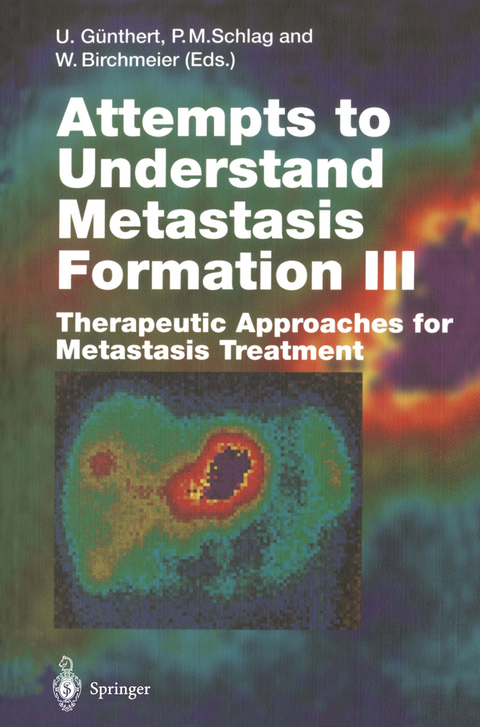
Attempts to Understand Metastasis Formation III
Springer Berlin (Verlag)
978-3-642-80073-3 (ISBN)
Prof. Dr. Peter M. Schlag, Direktor des Charité Comprehensive Cancer Center, Berlin.
List of Contents.- Micrometastasis Detection and Treatment with Monoclonal Antibodies.- Transcriptionally Targeted Gene Therapy.- Recombinant Antibody Fusion Proteins for Cancer Immunotherapy.- Influence of Local Cytokines on Tumor Metastasis: Using Cytokine Gene-Transfected Tumor Cells as Experimental Models.- Antitumor and Antimetastatic Activity of lnterleukin-12.- Curing Metastases? Gene and Peptide Therapy.- Effect of Antisense Inhibition of Urokinase Receptor on Malignancy.- Intervention in Receptor Tyrosine Kinase-Mediated Pathways: Recombinant Antibody Fusion Proteins Targeted to ErbB2.- Interactions Between CD44 and Hyaluronic Acid: Their Role in Tumor Growth and Metastasis.- Does Soluble CD44 Reflect the Clinical Behavior of Human Cancer?.- Signal Transduction as a Therapeutic Target.- Immunotherapy of Metastases.- Immunological and Biochemical Modulation in the Treatment of Advanced Colorectal Cancer: Update and Future Directions.- Surgical and Multimodality Approaches to Liver Metastases.
| Erscheint lt. Verlag | 14.12.2011 |
|---|---|
| Reihe/Serie | Current Topics in Microbiology and Immunology |
| Zusatzinfo | XVI, 262 p. |
| Verlagsort | Berlin |
| Sprache | englisch |
| Maße | 155 x 235 mm |
| Gewicht | 434 g |
| Themenwelt | Studium ► Querschnittsbereiche ► Infektiologie / Immunologie |
| Schlagworte | Adhesion Molecules • angiogenesis • Cell • Cytokine • cytokines • Gefäss • Gene • gene therapy • Geschwulst • immunotherapy • Krebs • Krebstherapie • Metastasis • Metastasisai • Molecular Biology • Regulation • Tumor • tumor progression • Tumor therapy |
| ISBN-10 | 3-642-80073-4 / 3642800734 |
| ISBN-13 | 978-3-642-80073-3 / 9783642800733 |
| Zustand | Neuware |
| Haben Sie eine Frage zum Produkt? |
aus dem Bereich


